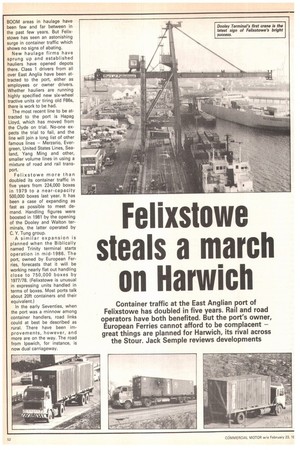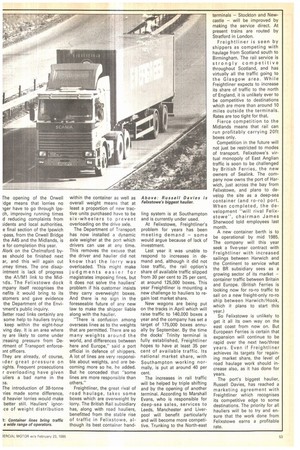Felixstowe steals a march on Harwich
Page 54

Page 55

If you've noticed an error in this article please click here to report it so we can fix it.
Container traffic at the East Anglian port of Felixstowe has doubled in five years. Rail and road operators have both benefited. But the port's owner, European Ferries cannot afford to be complacent — great things are planned for Harwich, its rival across the Stour. Jack Semple reviews developments
BOOM areas in haulage have been few arid far between in the past few years. But Felixstowe has seen an astonishing surge in container traffic which shows no signs of abating.
New haulage firms have sprung up and established hauliers have opened depots there. Class 1 drivers from all over East Anglia have been attracted to the port, either as employees or owner drivers. Whether hauliers are running highly specified new six-wheel tractive units or tiring old F86s, there is work to be had.
The most recent line to be attracted to the port is Hapag Lloyd, which has moved from the Clyde on trial. No-one expects the trial to fail, and the line will join a long list of other famous lines — Merzario, Evergreen, United States Lines, Sealand, Yang Ming and other, smaller volume lines in using a mixture of road and rail transport.
Felixstowe more than doubled its container traffic in five years from 224,000 boxes in 1979 to a near-capacity 500,000 boxes last year. It has been a case of expanding as fast as possible to meet demand. Handling figures were boosted in 1981 by the opening of the Dooley and Walton terminals, the latter operated by C. Y. Tung group.
A similar expansion is planned when the Biblically named Trinity terminal starts operation in mid-1986. The port, owned by European Ferries, forecasts that it will be working nearly flat out handling close to 750,000 boxes by 1977/78. (Felixstowe is unusual in expressing units handled in terms of boxes. Most ports talk about 20ft containers and their equivalent.) In the early Seventies, when the port was a minnow among container handlers, road links could at best be described as rural. There have been improvements, however, and more are on the way. The road from Ipswich, for instance, is now dual carriageway.
the opening of the Orwell Idge means that lorries no .iger have to go through losch, improving running times
d reducing complaints from ;idents and local authorities.
e final section of the Ipswich -pass, from the Orwell Bridge the A45 and the Midlands, is e for completion this year. Nork on the Chelmsford byss should be finished next ar, and this will again cut irney times. The one disapintment is lack of progress the A1/M1 link to the Midids. The Felixstowe dock mpany itself recognises the nefits it would bring to its stomers and gave evidence the Department of the Enviiment's public inquiry.
Better road links certainly are some help to hauliers trying keep within the eight-hour ving day, It is an area where ?y are likely to come under reasing pressure from Dertment of Transport enforce?nt officers.
They are already, of course, ider great pressure on 3ights. Frequent prosecutions r overloading have given uliers a bad name in the ?a.
The introduction of 38-tonne • ries made some difference, d heavier lorries would make better still. Hauliers' ignorce of weight distribution within the container as well as overall weight means that at least a proportion of new tractive units purchased have to be six-wheelers to prevent overloading on the drive axle.
The Department of Transport has now installed a dynamic axle weigher at the port which drivers can use at any time. This removes the excuse that the driver and haulier did not know that the lorry was overloaded. This might make judgments easier for magistrates imposing fines, but it does not solve the hauliers' problem if his customer insists they carry overweight boxes. And there is no sign in the foreseeable future of any new law to make the shipper liable along with the haulier.
"There is confusion among overseas lines as to the weights that are permitted. There are so many weights around the world, and differences between here and Europe," said a port official in defence of shippers. A lot of lines are very responsible about weights, and are becoming more so he, he added. But he conceded that "some lines are more responsible than others."
Freightliner, the great rival of road haulage, takes some boxes which are overweight by lorry. The British Rail subsidiary has, along with road hauliers, benefitted from the stable rise of traffic in Felixstowe, although its best container hand ling system is at Southampton and is currently under used.
At Felixstowe, Freightliner's problem for years has been meeting demand — some would argue because of lack of investment.
Last year it was unable to respond to increases in demand and, although it did not lose traffic, the rail option's share of available traffic slipped from 30 per cent to 25 per cent, at around 125,000 boxes. This year Freightliner is mounting a new challenge to hauliers to regain lost market share.
New wagons are being put on the tracks in April which will raise traffic to 140,000 boxes a year and the company has set a target of 175,000 boxes annually by September. By the time the docks' Trinity terminal is fully established, Freightliner hopes to have at least 35 per cent of available traffic. Its national market share, with Southampton working normally, is put at around 40 per cent.
The increases in rail traffic will be helped by triple shifting and by the opening of another terminal. According to Marshall Evans, who is responsible for deep-sea sales, services to Leeds, Manchester and Liverpool will benefit particularly and will become more competitive. Trunking to the North-east terminals — Stockton and Newcastle — will be improved by making the service direct. At present trains are routed by Stratford in London.
Freightliner is seen by shippers as competing with haulage from Scotland south to Birmingham. The rail service is strongly competitive throughout Scotland, and has virtually all the traffic going to the Glasgow area. While Freightliner expects to increase its share of traffic to the north of England, it is unlikely ever to be competitive to destinations which are more than around 10 miles outside the terminals. Rates are too tight for that.
Fierce competition to the Midlands means that rail can run profitably carrying 20ft boxes only.
Competition in the future will not just be restricted to modes of transport. Felixstowe's virtual monopoly of East Anglian traffic is soon to be challenged by British Ferries, the new owners of Sealink. The company now owns the port of Harwich, just across the bay from Felixstowe, and plans to develop the site as a deep-sea container land ro-ro) port. When completed, the development "will rival Felixstowe", chairman James Sherwood told employees last month.
A new container berth is to be operational by mid 1985. The company will this year seek a five-year contract with Freightliner with increased sailings between Harwich and the Continent to service what the BR subsidiary sees as a growing sector of its market — container traffic between Britain and Europe. (British Ferries is looking now for ro-ro traffic to sail on a new freight-only ro-ro ship between Harwich/Hook, which it plans to start this year.) So Felixstowe is unlikely to get it all its own way on the east coast from now on. But European Ferries is certain that expansion will continue to be rapid over the next two/three years. Even if Freightliner achieves its targets for regaining market share, the level of road haulage work should increase also, as it has done for years.
The port's biggest haulier, Russell Davies, has reached a marketing agreement with Freightliner which recognises its competitive edge to some destinations. The priority for all hauliers will be to try and ensure that the work done from Felixstowe earns a profitable rate.




















































































